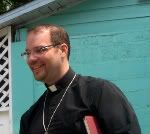a priest's musings on the journey
Friday, April 20, 2007
The Roman Church Rejects the Doctrine of Limbo

During my junior year of seminary, I spent my summer at West Virginia University Hospital in Morgantown, WV, doing a unit of Clinical Pastoral Education. I normally worked on the cardiology floor; however, we rotated on call nights. I dreaded my on call rotation- "something" always happened. I witnessed more deaths during those weeks than I have in all of my years as a priest combined. One of the hardest moments for me occurred mid-way through the summer. I had been a quiet evening and I was contemplating going to my apartment to sleep. It was in walking distance, and I could get to the hospital quickly if I was needed. Just when I was ready to leave, I received a call from neo-natal. An infant had died and the parents were asking for a chaplain. I grabbed my Prayer Book and headed upstairs. I entered the room to see the mother rocking this beautiful boy who looked as if he were sweetly sleeping. I introduced myself and we talked for a moment and I asked if I could say some prayers and read a passage from the Scriptures. They agreed, wanting to turn to their faith for some comfort. When we were finished, the father asked me if I would baptize their son. I knew baptism was a Sacrament for the Living; I knew every theological reason why I should deny their request. Yet, I heard myself asking for a bowl filled with water. I did not hesitate to offer the pastoral care these grieving parents needed. This was not the time for a lesson on sacramental theology or for a solteriological debate. These parents were concerned that their child would not go to Heaven unless I baptized him. All I could do was offer whatever comfort I could give. So, I baptized the child.
One could write this entire episode off as the superstitious ignorance of Appalachian Hillbillies, except for the factthat the Doctors of the Church have wrestled for centuries with the question of the fate and eternal abode of unbaptized children. St Augustine taught in his On Merit and the Forgiveness of Sins; the Baptism of Infants that they went to hell since they had not recieved the grace of justification and the cleansing from the stain of original sin (which can only be received through the Sacrament of water baptism, baptism by desire- like the baptism of one who dies as a catechuman preparing for baptism, or baptism by blood- like the baptism of the Holy Innocents). Other theologians agreed that they could not go to Heaven, but because they had not committed any personal sins, it was reasonable to believe that they would rest in some peaceful place apart from heaven and hell, much like the place where the Just who died before Christ rested before Christ descended to the place of the dead to free them.

St Thomas Aquinas taught that the unbaptized children could not behold the beatific vision of God because they were still in sin. Nonetheless, they lived in an intermediary place of joy and peace, not knowing that an even greater joy existed in Heaven with God. Although this was never an official dogma, this place was commonly referred to as limbo, and became an unofficial teaching of the Church.
In 1442 at the Council of Florence, the Roman Church affirmed the teaching that batism was neccesary for salvation. However, in 1547 the Council of Trent taught that one's desire to be batized could make it possible for one to be saved without water baptism if they died before receiving the sacrament. The Council of Trent also refused to condemn as heretical the teachings of Thomas Cardinal Cajetan who reasoned that a mother's desire for her child to be baptized would save the infant who had died in her womb.
Throughout the 18th and 19th centuries, theologians continued to write about how unbaptized infants could be saved from hell. However, it was not until 1952 that a theologian would suggest that the possibility that unbaptized infants could be saved for Heaven. Ludwig Ott wrote:
"Other emergency means of baptism for children dying without sacramental baptism, such as prayer and the desire of the parents or the Church (vicarious baptism of desire - Cajetan), or the attainment of the use of reason in the moment of death, so that the dying child can decide for or against God (baptism of desire - H. Klee), or suffering and death of the child as quasi-Sacrament (baptism of suffering - H. Schell), are indeed possible, but their actuality cannot be proved from Revelation. Cf. D 712." Fundamentals of Catholic Dogma, Book 2, Section 2, § 25 (p. 114 of the 1963 edition)

In 1984 Joseph Ratzinger wrote in The Ratzinger Report that he rejected the idea that unbaptized infants could not be saved. In 1992 the Catechism of the Catholic Church was changed to read:
As regards children who have died without baptism, the Church can only entrust them to the mercy of God, as she does in her funeral rites for them. Indeed, the great mercy of God, who desires that all men should be saved, and Jesus' tenderness toward children, which caused him to say, 'Let the children come to me, do not hinder them' [Mark 10:14, cf. 1 Tim. 2:4], allow us to hope that there is a way of salvation for children who have died without baptism. All the more urgent is the Church's call not to prevent little children coming to Christ through the gift of holy baptism.
Today the Roman Church's International Theological Commission published a report which argued that the teaching of limbo was never a part of the official teaching of the Church and should be rejected because of its "unduly restrictive view of salvation". Go here for the entire story.
:: posted by Padre Rob+, 7:11 PM

